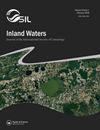多样性变化对浮游植物群落代谢的影响
IF 2.3
3区 环境科学与生态学
Q1 LIMNOLOGY
引用次数: 1
摘要
浮游植物群落组成的变化导致水生生态系统功能的剧烈变化。在这项研究中,我们假设Kinneret湖浮游植物群落组成的变化导致了湖泊生态系统中有机物初级生产和分解之间关系的显著变化。为了验证这一点,我们创建了一种基于多样性指数的长期动态及其与潜在扰动的关系的统计分析的方法:湖泊水位、营养负荷和年平均表层温度的变化。利用Simpson多样性指数和群落加权平均特征值(功能多样性指数)估算藻类群落的生物多样性。群落比呼吸和光合作用同化数被认为是表征浮游植物在有机质循环中作用的功能特征。所观察到的多样性指数的时间趋势提供了生物群落从大的、相对较快的需氧分解和较慢的光合作用生产者向较慢的好氧分解和较快的光合作用生产者转变的估计。群落呼吸的直接测定结果和(间接)湖泊表层水体中微生物活性的降低证实了这些趋势。本文章由计算机程序翻译,如有差异,请以英文原文为准。
The effects of changes in diversity on phytoplankton community metabolism
ABSTRACT Changes in composition of phytoplankton communities cause drastic changes in functioning of aquatic ecosystems. In this study, we hypothesized that the shifts in composition of the phytoplankton community of Lake Kinneret induced notable shifts in the relationship between primary production and decomposition of organic matter in the lake ecosystem. To test this, we created an approach based on a statistical analysis of long-term dynamics of diversity indices and their relationships with potential perturbations: changes in lake water level, nutrient loads, and annual average epilimnetic temperature. Biodiversity of the algal community was estimated using Simpson’s Diversity Index and community-weighted mean trait value (functional diversity index). Specific community respiration and photosynthesis assimilation number were considered as the functional traits characterizing the role of phytoplankton in cycling organic matter. The observed temporal trends in the diversity indices provided estimates of the shift in the biotic community from large, relatively faster aerobic decomposing and slower photosynthesizing producers towards slower aerobic decomposing and faster photosynthesizing producers. These trends were confirmed by the results of direct determination of community respiration and (indirectly) by the reduced microbial activity in the epilimnetic waters of the lake.
求助全文
通过发布文献求助,成功后即可免费获取论文全文。
去求助
来源期刊

Inland Waters
LIMNOLOGY-MARINE & FRESHWATER BIOLOGY
CiteScore
6.10
自引率
9.70%
发文量
34
审稿时长
>12 weeks
期刊介绍:
Inland Waters is the peer-reviewed, scholarly outlet for original papers that advance science within the framework of the International Society of Limnology (SIL). The journal promotes understanding of inland aquatic ecosystems and their management. Subject matter parallels the content of SIL Congresses, and submissions based on presentations are encouraged.
All aspects of physical, chemical, and biological limnology are appropriate, as are papers on applied and regional limnology. The journal also aims to publish articles resulting from plenary lectures presented at SIL Congresses and occasional synthesis articles, as well as issues dedicated to a particular theme, specific water body, or aquatic ecosystem in a geographical area. Publication in the journal is not restricted to SIL members.
 求助内容:
求助内容: 应助结果提醒方式:
应助结果提醒方式:


